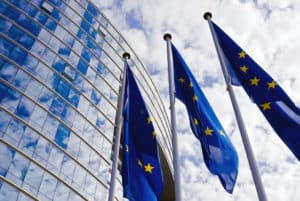Deutsche Bank has avoided a €156 million fine for its participation in a bond trading cartel by revealing the activity to the regulator under the leniency programme.
Rabobank received a €26.6 million fine for its participation.
 The fines relate to a trading cartel between the two banks in Euro-denominated SSA bonds and Government Guaranteed bonds that took place between 2006 and 2016.
The fines relate to a trading cartel between the two banks in Euro-denominated SSA bonds and Government Guaranteed bonds that took place between 2006 and 2016.
According to the Commission’s findings, Deutsche Bank’s EUR SSA desk in Frankfurt and Rabobank’s Investment Grade Bonds desk in London “exchanged commercially sensitive information and coordinated their trading and pricing strategies” using Bloomberg emails, instant messages and online chatrooms.
The information exchanged included volumes, current and future strategies and positions, identities of counterparties and their requirements for buying and selling the bonds.
The watchdog confirmed it was investigating the two banks over the activity in December last year.
Speaking at the time of the announcement Deutsche Bank said: “Deutsche Bank has proactively cooperated with the European Commission in this matter and as a result has been granted conditional immunity. In accordance with the European Commission’s guidelines, Deutsche Bank does not expect a financial penalty. As this is an ongoing investigation, we cannot comment further.”
If successful, a leniency program applicant can either successfully avoid the entire fine or receive a large reduction from it.
The cartel is the third of its kind to come to light in the last few years after five major investment banks – Barclays, Royal Bank of Scotland (RBS), Citigroup, JP Morgan and MUFG – were handed fines totalling around €1 billion by authorities in Europe in 2019 for taking part in cartels to rig the foreign exchange spot market for 11 currencies.
More recently in 2021, in two separate bond cartels, Nomura, UBS, and UniCredit in May and Bank of America Merrill Lynch, Credit Agricole and Credit Suisse in April were fined €371 and €28 million, respectively.
Regulators globally have begun a widespread clampdown on unregulated channels of communication in light of the findings.
The US Securities and Exchange Commission (SEC) confirmed in November 2022 that its enforcement penalties had surged to a record in the government’s fiscal year, with its total enforcement actions totalling $6.4 billion in fines, up from $3.9 billion in 2021.
Fines around the use of messaging services such as WhatsApp to conduct business have largely driven this rise. Bank of America was served with a $200 million fine from the SEC in July 2022 relating to its use of “unapproved personal devices”, joining JP Morgan and Morgan Stanley who both also received multi-million-dollar fines from the regulator in the same month.